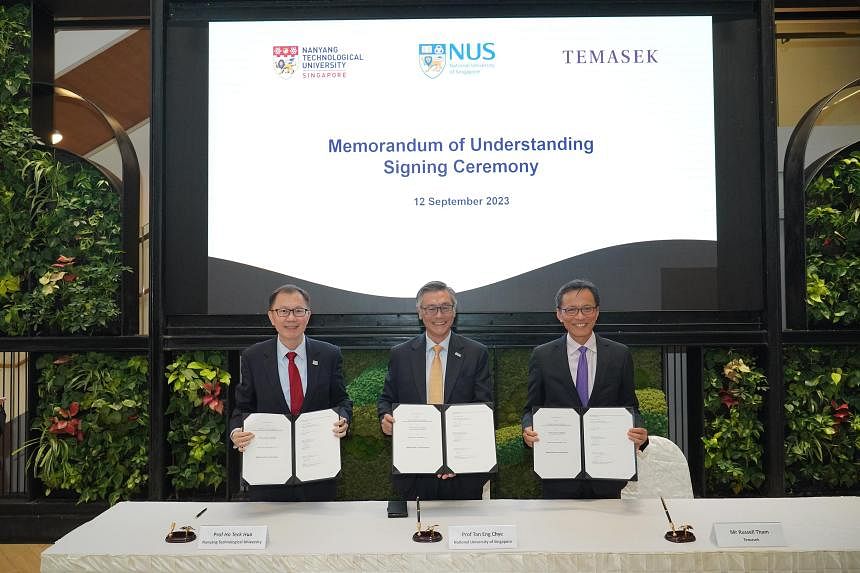September 12, 2023, SINGAPORE – A pilot programme to help promising deep tech ventures build up their businesses and go to market was launched on Tuesday through a $75 million joint investment by Singapore’s Temasek, Nanyang Technological University (NTU) and National University of Singapore (NUS).
The three organisations committed the funds over two years to accelerate the development, commercialisation and eventual listing of successful deep tech start-ups from the pipeline of research projects at NTU and NUS.
The two universities will also develop a common licensing framework for intellectual property (IP), which will smoothen and speed up the process for spin-off companies to license university technologies. This usually takes up to five months, but will be cut to a month.
A memorandum of understanding was signed by Temasek, NTU and NUS at Temasek Shophouse on Tuesday.
Temasek will invest $65 million through Xora Innovation, while NUS and NTU will each put in $5 million.
Xora is Temasek’s early-stage deep tech investing platform, and the $65 million is part of the $1 billion a year that Temasek had committed in October 2021 to pump into funding the development of deep tech innovation.
Mr Russell Tham, Temasek’s head of emerging technologies and joint head of the enterprise development group (Singapore), said deep tech involves using science-based principles from domains such as physics, chemistry and biology to come up with a new invention or innovation.
He cited the examples of new material classes that can capture carbon better, or new chemistry processes that can turn iron ore to iron before it is made into steel.
The partnership between Temasek and the two universities will initially focus on building globally competitive ventures in three areas: energy transition, biotechnology, and the future of compute and cognition.
Mr Tham said the future of compute and cognition refers to innovation in next-generation computing technologies like quantum computing. Artificial intelligence (AI) and generative AI also fall under this area.
He added that Temasek is not limited to investing in the three areas. “If there is more interesting research coming out from the universities, we are happy to take a look at it,” he said.
Mr Tham also explained how potential deep tech start-ups will be brought to market.
He said that when university researchers make a scientific breakthrough and Temasek assesses that the innovation can be commercialised, its wholly owned subsidiary Xora will help the researchers form a new company.
Xora will bring in seasoned entrepreneurs, who will mentor the researchers on how they can bring their innovations to market; provide the capital and funding support they need; and link them up with global experts and other investors.
The plan is to launch at least two promising start-ups annually, Mr Tham said.
He added that Temasek will not endeavour to commercialise every single innovation. “We must feel that the innovation is very promising… and if we do the research and development properly, it creates a unique proposition for customers and investors.”
The eventual aim, he said, is a public listing for the start-up, and economic value for Singapore.
“This journey, if successful, will create more employment in Singapore,” he added.
Professor Tan Eng Chye, president of NUS, said the collaboration with NTU and Temasek will combine the three organisations’ expertise and resources in research, innovation and enterprise.
This will hopefully facilitate many opportunities for deep tech start-ups and spur the growth of a critical mass of entrepreneurs, making Singapore a global hub for deep tech, he added.
Professor Ho Teck Hua, president of NTU, called the partnership a “game changer” in helping Singapore deep tech start-ups compete on the global stage.
“We curate a set of start-ups. We have much higher chance of getting a blockbuster enterprise. Hopefully one of them will become a blockbuster.”
Mainboard-listed Nanofilm Technologies, which specialises in advanced materials and coatings, was an NTU offshoot which benefited from deep tech investments and eventually listed on the Singapore Exchange 20 years later, in October 2020.
Mr Tham said tech giants Google and Nvidia are global examples of successful innovative ventures which started small – a path he hopes local start-ups can follow.
“It is about how to start one, and then grow it to a world-class champion”.





